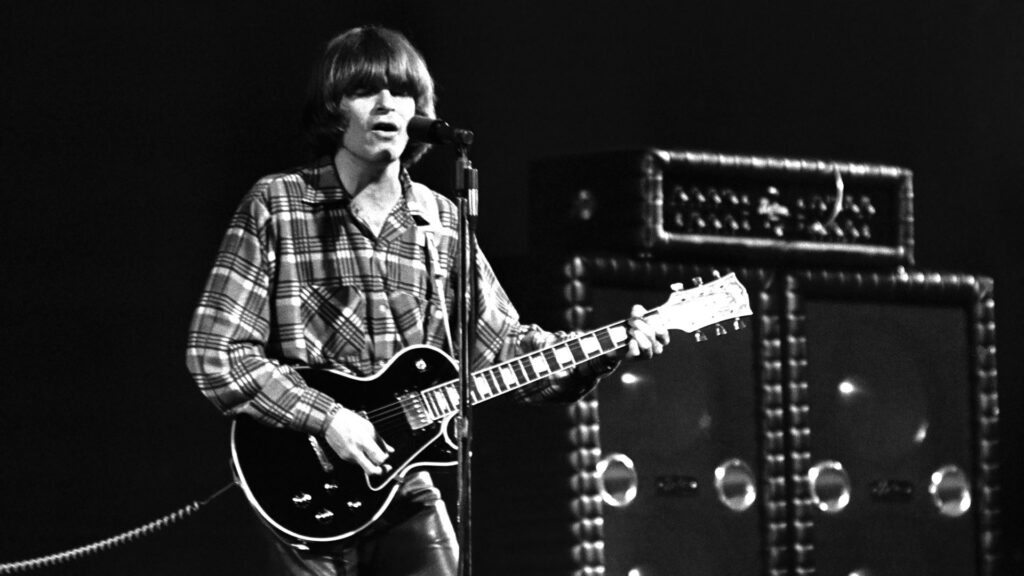
“Eye of the Zombie” is Fogerty’s alarm bell in a pop disguise—a grim little groove that asks what happens when whole crowds keep moving, but stop feeling.
When John Fogerty followed the sunshine-and-baseball triumph of Centerfield with “Eye of the Zombie,” he didn’t offer a victory lap. He offered a darker streetlight. The song arrived in 1986 as the title track and lead single from his album Eye of the Zombie (released September 29, 1986), and its chart story tells you immediately what kind of era this was for him: the single debuted at No. 91 and peaked at No. 81 on Billboard’s Hot 100, spending four weeks on the chart. Yet on rock radio, the same track climbed far higher—peaking at No. 3 on Billboard’s Mainstream Rock chart. The album itself debuted at No. 44 and peaked at No. 26 on the Billboard 200, a respectable showing that still felt, in the shadow of Centerfield, like a complicated conversation rather than a simple celebration.
And then there’s the oddly poignant laurel: Fogerty earned a Grammy nomination for Best Rock Vocal Performance, Male for “Eye of the Zombie.” It’s one of those moments music history loves—when the industry nods at something the general audience didn’t fully embrace, as if to say: we heard what you were trying to do.
The “behind the scenes” of this record matters, because it’s not just a song—it’s a mood swing. Eye of the Zombie was Fogerty’s first solo album made with a backing band rather than the more solitary, layered approach he’d taken before; he also produced the album himself. It was recorded at The Lighthouse in North Hollywood, California (with mixing credited to major Hollywood rooms), grounding this eerie little title track in very real studio craft. Even the cover carried a story: special-effects artist John Carl Buechler designed the makeup, and Fogerty’s original cover concept—tribal markings—was reportedly vetoed by the label because David Lee Roth had already used a similar look.
So what is this song actually saying?
Despite the horror-movie language, “Eye of the Zombie” isn’t really about monsters. It’s about people—about the dead-eyed drift that can take over a society when fear, headlines, and appetite for spectacle begin to run the show. Fogerty’s title is the genius stroke: he doesn’t say “the zombie,” like it’s one creature we can point at safely. He says the eye—the stare, the gaze, the way we look when we’re no longer fully home inside ourselves. That’s why the song feels so unnerving even when it rocks: it suggests the transformation isn’t dramatic. It’s gradual. It’s the slow replacement of conscience with reflex.
Musically, you can hear him wrestling with his own era. The mid-’80s sound—tighter, shinier, sometimes a little metallic—presses up against Fogerty’s swamp-born instincts. The result is intentionally uneasy: a groove that wants to move your feet while the lyric keeps tapping you on the shoulder, insisting you notice what you’re dancing past. In a time when rock could be either glossy or bombastic, Fogerty chose something stranger: a dark fable you could play loud in the car, then sit with later when the engine is off and the night feels too quiet.
There’s also a bittersweet coda to the story. After touring the record in 1986, Fogerty largely stopped performing material from Eye of the Zombie for years, only revisiting at least one song from that era much later. That silence reads like an artist closing a door—not because the room was empty, but because the memories inside it were too sharp.
In the end, “Eye of the Zombie” remains one of Fogerty’s most revealing pivots: a song written by a man who knew how to soundtrack American joy, choosing instead to soundtrack American unease. It doesn’t ask you to panic. It asks you to wake up. And maybe that’s the most haunting part: the monster in Fogerty’s story doesn’t lurch in from a graveyard. It’s already among us, already smiling, already swaying to the beat—until somebody, somewhere, remembers how to look alive again.